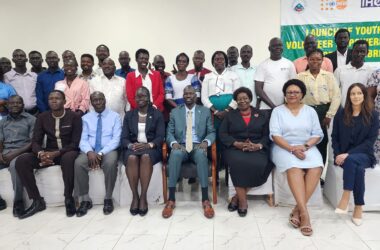By Dogga Morris
Women leaders from across South Sudan gathered in Juba on the 3rd and 4th of June 2025 for a two-day public convening focused on the proposed Family Law Bill.
This public convening was organized by the Centre for Inclusive Governance, Peace and Justice (CIGPJ), with the support of the Norwegian Peoples Aid (NPA), in consultation with the Ministry Gender, Child and Social Welfare, the event brought about 35 participants from Civil Society organizations, Media, women led organizations, Students from different learning institutions, Members of the Revitalized National Legislative Assembly and community leaders in Juba at the South Sudan Council of Churches to discuss pertinent issues relating to key chapters of the proposed family law bill, and to raise public awareness and understanding of the content, purpose, and potential impact of the Family Law, and to also simplify complex legal concepts and relating these issues in the bill to the lived realities and experiences women and Men undergo in marriages.
During the discussions, key chapters of the proposed bill such as general provisions applicable to marriages in South Sudan, matrimonial rights and obligations, Divorce and separation, and inheritance were respectively discussed, and the participants gave key recommendations to the above chapters which will later be submitted to the Ministry of Gender, Child and Social Welfare to be incorporated to the bill.
Meanwhile customary law and practices remain entrenched in South Sudan society, despite legal provisions that have outlawed some harmful customary practices such as abductions, forced marriages, Child grooming, wife inheritance, among others, the participants cited that there is a conflict between customary laws and statutory law that requires harmonization
Nunu Diana Alison, the project coordinator of this project, stated that it was important for civil society, women leaders and policy makers to review the proposed bill to ensure all issues related to marriage and family are captured and included.
“This public forum, will lay out a strategy of how key stakeholders, such as the parliament, the community leaders, the civil society, women groups can play a role in amplifying their voices collectively to push for the enactment of the bill and to also lay out strategies on how the bill if passed into a law can be implemented and disseminated up to the local level,” she said.
Diana explained that the bill is not just about traditional or customary marriages but also outlines which other harmful customary practices are prohibited in the proposed bill; how other type of marriages which includes civil, Christian, and Islamic unions, will be administered if the bill is passed into a law.
She pointed out that several existing laws, like the Maputo Protocol, have not been implemented and enacting the proposed family law bill and the Anti-GBV bill will be a significant step towards the implementation of the Maputo Protocol which was ratified since 2023 in South Sudan.
Since gaining independence in 2011, South Sudan has faced challenges due to a complex legal system that includes statutory, customary, and religious laws. This has often led to unfairness, particularly concerning family and gender rights.
Gender-based violence remains a serious issue, worsened by years of conflict that have deepened discriminatory practices. The lack of effective enforcement of protective laws and stigma against victims complicates matters.
Diana said the draft Bill aims to include provisions that address such complications, citing situations where mothers raise children alone after divorce, only for fathers to later try to claim custody.
“When a family is affected, the whole community is also affected, even the whole nation is affected. So, let’s extend an olive leaf…to ensure that this bill is passed without any objection,” she urged.
Meanwhile, Hon Viola Samuel Sati, chairperson of the women’s parliamentary caucus, at the National Parliament, who opened the forum, stated that the Draft Family Law Bill defines a very significant part of our society.
“It tackles marriages, it tackles divorce, it tackles inheritance, it tackles equality and so many things,” she added.
“As a woman in South Sudan, I feel it is about time that we begin to focus our discussion on where the family bill is and when it is coming, and what is inside and what will be inside that family law. It is not just a matter of having the law, but it is a matter of what is inside,” she said.
She urged women to continue advocating for the bill and to seek support from civil society and international organizations.
The Lawmaker also acknowledged the need to balance traditional customs with modern societal needs.
Mr. Elias Khamis Barnaba, a chief from Greater Yei supported the proposed family law bill, noting that there is lack of codified marriage law in South Sudan to ensure consistency.
He hopes the bill will address the rights of women and children, which he feels are currently missing from the constitution.
Barnaba acknowledged the difficulties chiefs face in handling family matters under different traditional laws, emphasizing the need for a single, unified law for all communities.
Grace John Kenyi, Executive Director of the Community Initiative Development Association (CIDA), a women-led organization, expressed her happiness at attending the forum.
She noted that once the bill becomes law, it will help resolve many family disputes.
“We have realized that there are many gaps, and we need to address that by having other laws that take into consideration the issues that are not addressed in other laws in South Sudan,” she said.
“It is important to track such processes so that our ideas are incorporated into this law. And other stakeholders like the chiefs should be part of this because many issues that should not be addressed under customary courts are often handled by the chiefs,” she added.
The Forum was organized under the Project, “Strengthening SGBV Responses and Linkages to Transitional Justice Mechanisms and Empowering Women in Political Participation.”



